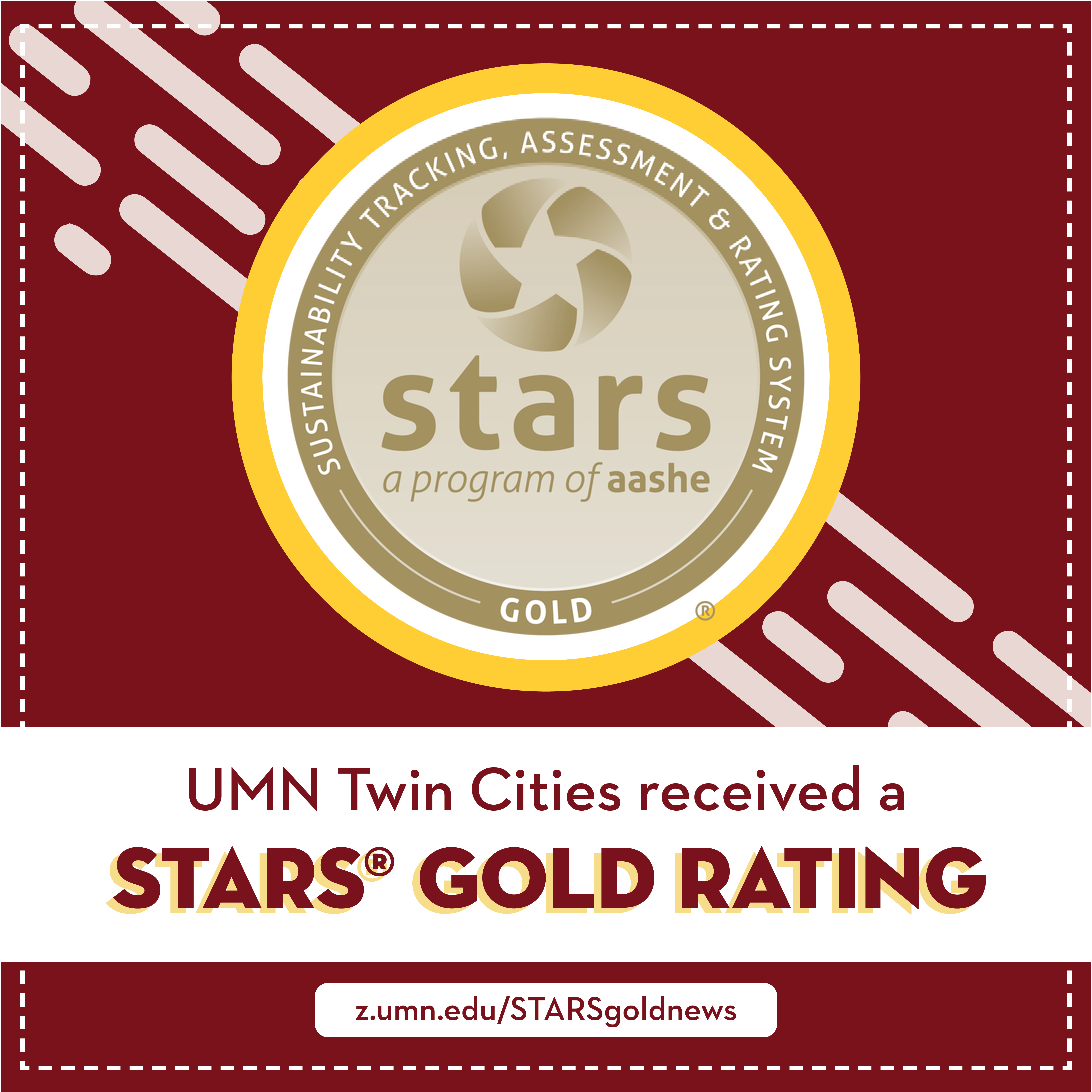
The University of Minnesota Twin Cities has earned a STARS® Gold rating in recognition of its sustainability achievements from the Association for the Advancement of Sustainability in Higher Education (AASHE). The Sustainability Tracking, Assessment & Rating System™ (STARS®) measures and encourages sustainability in all aspects of higher education.
More than 400 institutions have earned a STARS® rating, making AASHE’s STARS® program the most widely recognized framework in the world for publicly reporting comprehensive information related to a college or university’s sustainability performance. Participants report data and accomplishments in five areas: academics, engagement, operations, planning and administration, and innovation and leadership.
The University of Minnesota Twin Cities’ STARS® report is publicly available at z.umn.edu/STARSgold.
Highlights of the University’s score include:
- Research: The University received 16.79 out of 18 points for research, highlighting the many researchers engaged in sustainability research, support for sustainability research, and open access to research. The student sustainability research program, the Institute on the Environment’s ACARA Program, is a leadership incubator program open to students from any discipline who want to be part of solving real-world challenges, like equitable access to clean water, health care, energy, and healthy food. Finalists receive mentorship on developing proposals and pitches, as well as support in refining their goals and creating a viable launch program.
- Diversity and Affordability: The University earned 8.3 out of 10 points for diversity and affordability, highlighting programs to support and recruit from underserved groups, provide tuition assistance, and provide support through Living Learning Communities and The Multicultural Center for Academic Excellence, and more. The College MADE (Multicultural Access, Diversity, and Equity) Initiative provides individual colleges within the University with data-driven approaches to increase representational diversity, improve campus climate, and create partnerships to grow diversity, equity, and inclusive excellence across our campuses. The Circle of Indigenous Nations (COIN) recruits, retains and supports graduation of American Indian/First Nations and Alaska Native students and strives to bridge the richness of the surrounding American Indian communities with the strengths of the University’s research, education and teaching.
- Curriculum: Programs such as the Environmental Sciences, Policy and Management (ESPM) undergraduate program and the Master of Science in Science, Technology, and Environmental Policy program enhance sustainability curriculum at the University and the stand-alone, interdisciplinary Sustainability Studies Minor immerses undergraduate students in the exploration of real-world problems from a variety of academic perspectives, incorporating disciplines from across the natural, social and applied sciences through curriculum and programs such as the Undergraduate Leaders Program.
- Engagement: Orientation, Student Life, and Outreach earned full points for their work on Welcome Week and other initiatives and events. The Office of Sustainability engages with students during the annual Sustainability Action Fair, part of Welcome Week, to emphasize the importance of sustainability on campus.
- Community Partnerships: The University received full points for community partnerships, recognizing the University District Alliance, Hennepin-University Partnership, and Regional Sustainable Development Partnerships (RSDP). RSDP and other organizations collaborated on GreenStep Cities/Tribal Nations: a statewide voluntary challenge, assistance, and recognition program to help cities achieve their sustainability and quality-of-life goals.
- Water: Features across campus including rain gardens and rainwater harvesting for cooling buildings and flushing toilets earned a high score in rainwater management.
This is the fourth STARS® submission by the Twin Cities campus since 2011 and its second Gold rating. The University’s strategic plan, MPact 2025, established a goal to Build a Fully Sustainable Future. As part of this effort, each campus in the system will pursue a Gold rating on the STARS® tool by 2025. The Morris and Duluth campuses have also received Gold STARS® ratings. By participating in STARS® the University will gain insights into its sustainability strengths and opportunities. These insights will enhance the breadth and depth of the University’s work to build a fully sustainable future through education, research, engagement, and operational excellence.
“STARS® was developed by the campus sustainability community to provide high standards for recognizing campus sustainability efforts,” said AASHE Executive Director Meghan Fay Zahniser. “The University of Minnesota Twin Cities has demonstrated a substantial commitment to sustainability by achieving a STARS® Gold Rating and is to be congratulated for their efforts.”
"A Gold STARS rating is an important step in our pathway to building a fully sustainable future at the University,” said Shane Stennes, systemwide Chief Sustainability Officer. “It presents an opportunity to both celebrate our diverse areas of success and collaborative sustainability work across the institution, and also to shed light on opportunities for us to improve.”
“I've recently come to the University,” said Kate Nelson, Director of Campus Sustainability. “The Gold STARS® rating shows the dedication and investment the University has made over the years for a sustainable future. This is what attracted me to the team and the campus. This groundwork makes it exciting to see what else is possible.”
About AASHE:
AASHE is an association of colleges and universities that are working to create a sustainable future. AASHE’s mission is to empower higher education to lead the sustainability transformation. It provides resources, professional development and a network of support to enable institutions of higher education to model and advance sustainability in everything they do, from governance and operations to education and research. For more information about AASHE, visit www.aashe.org. For more information about the STARS® program, visit stars.aashe.org.